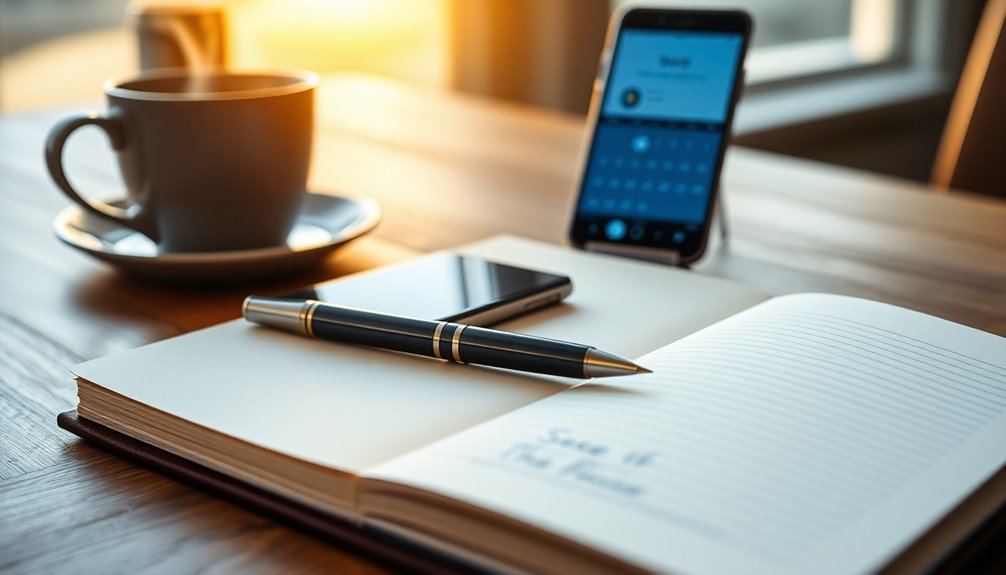Revealing the secrets of interview questions can set you apart from the competition. You'll encounter various question types, like personality assessments and behavioral predictions. To prepare, research the job description and match your experiences with the required skills. Rehearse common questions using the STAR method to structure your responses clearly. Highlight your qualifications, showing credibility and expertise. Being aware of industry trends and specific tools also demonstrates your preparedness. By focusing on authenticity and the impact of your past actions, you can build rapport. There's more to discover about mastering interviews, so stay tuned for more insights.
Key Takeaways
- Understand the different types of interview questions to tailor your responses effectively, such as behavioral, personality, and industry-specific queries.
- Research the job description thoroughly to align your experiences and qualifications with the employer's expectations and needs.
- Utilize the STAR method to structure your answers, emphasizing the situation, task, action, and result in your past experiences.
- Stay updated on current industry trends and challenges to demonstrate your knowledge and strategic thinking during the interview.
- Practice active listening to ensure you fully understand the interviewer's questions and can respond appropriately and thoughtfully.
Types of Interview Questions

When you're preparing for an interview, understanding the different types of interview questions can give you a significant edge.
You'll encounter personality assessment questions that reveal your character and fit within the company culture. Ability demonstration questions require you to showcase specific skills and past performances. Qualification verification questions focus on validating your educational background and relevant experiences.
Behavioral prediction questions ask how you've handled challenges in the past, providing insight into your decision-making processes. Ultimately, industry knowledge questions assess your understanding of the industry and its current issues.
Preparing for Interviews

Preparing for interviews can feel overwhelming, but with the right approach, you can boost your confidence and performance.
Start by researching the job description and the company. This will help you understand what they're looking for and how your skills align.
Next, identify your relevant experiences that match their requirements. Rehearse answers to common interview questions, focusing on your achievements and how they relate to the position.
Practice storytelling for behavioral questions, as specific examples demonstrate your capabilities.
Finally, listen carefully during the interview to grasp what the interviewer seeks in your responses.
This preparation not only enhances your confidence but also showcases your genuine interest in the role and the company's mission.
Importance of Qualifications

Qualifications play an essential role in the interview process, as they provide concrete evidence of your abilities and expertise. When you present your qualifications effectively, you demonstrate your potential value to the employer. This not only builds your credibility but also sets you apart from other candidates.
| Qualification Type | Importance | Example |
|---|---|---|
| Education | Foundation of knowledge | Bachelor's in Marketing |
| Certifications | Validates specialized skills | Project Management Professional |
| Experience | Demonstrates practical ability | 5 years in digital marketing |
| Skills | Highlights specific expertise | Proficiency in Adobe Suite |
Behavioral Insights in Interviews

Understanding behavioral insights in interviews can greatly enhance your performance as a candidate. These insights help you showcase how past experiences shape your work ethic and problem-solving skills.
When answering behavioral questions, consider these three key points:
- Use the STAR Method: Structure your responses by outlining the Situation, Task, Action, and Result to provide clear and concise answers.
- Be Authentic: Share genuine stories that reflect your true self and values, as this builds trust with the interviewer.
- Focus on Impact: Highlight how your actions positively affected your team or organization, demonstrating your potential value to the employer.
Industry-Specific Knowledge

Demonstrating industry-specific knowledge during an interview sets you apart from other candidates. When you discuss current trends, challenges, and innovations in your field, you show your commitment and readiness for the role.
Research the company and the industry to understand key issues they face. Be prepared to answer questions like, "What do you think is the biggest issue our industry faces today?" This not only showcases your knowledge but also reflects your strategic thinking.
Highlight relevant tools and methodologies you're familiar with, and suggest ideas for improvements or advancements. By connecting your insights to the company's goals, you reinforce your value as a candidate who can contribute meaningfully from day one. Additionally, understanding the concept of decentralized control in cryptocurrency can provide valuable insights into the future of digital transactions and their implications for various industries.
Fostering Collaboration and Teamwork

Effective collaboration and teamwork are essential for achieving common goals within any organization.
When you foster a collaborative environment, you not only enhance productivity but also build trust among team members.
Here are three key strategies to encourage teamwork:
- Open Communication: Encourage team members to share ideas and feedback freely, creating a safe space for dialogue.
- Define Roles Clearly: Make sure everyone knows their responsibilities, which helps to avoid confusion and overlap in tasks.
- Celebrate Successes Together: Recognize team achievements to reinforce a sense of unity and motivate members to work together for future goals. Additionally, incorporating trust-building activities can significantly enhance team dynamics and strengthen relationships among colleagues.
Time Management in Job Search

A successful job search requires strategic time management to navigate the often intimidating process. You need to set clear goals and prioritize tasks to maximize your efforts.
Start by breaking down your job search into manageable segments: research companies, tailor your resume, and practice interview questions. Allocate specific time blocks each day for these activities to stay organized and focused.
Use tools like calendars and to-do lists to track your progress and deadlines. Remember to schedule breaks to avoid burnout, keeping your energy levels high. Additionally, consider the financial implications of your job search, such as legal fees that may arise during a divorce, which can impact your job search strategy.
Frequently Asked Questions
How Do I Follow up After an Interview?
After your interview, it's crucial to follow up promptly.
Send a thank-you email within 24 hours to express your appreciation for the opportunity and reiterate your interest in the position. Mention specific details from the interview to personalize your message.
If you haven't heard back within a week or so, a polite inquiry about your application status shows your enthusiasm and keeps you on their radar.
Keep it concise and professional.
What Should I Wear to an Interview?
When deciding what to wear to an interview, think about the company's culture. If it's formal, opt for a suit or professional dress.
For a casual environment, smart casual attire works well, like dress shirts or blouses paired with slacks. Make sure your clothes are clean and pressed.
Pay attention to grooming, too. You want to project confidence and professionalism, so choose an outfit that makes you feel comfortable and self-assured.
How Can I Handle Tricky Interview Questions?
Did you know that 70% of interviewers appreciate candidates who can handle tricky questions with grace?
When faced with tough inquiries, stay calm and take a moment to gather your thoughts. It's okay to ask for clarification if needed.
Use the STAR method—Situation, Task, Action, Result—to structure your answers.
Practice common challenging questions beforehand, so you feel confident.
What Questions Should I Ask the Interviewer?
When you're in an interview, asking questions shows your interest and helps you gauge if the company's a good fit for you.
Consider asking about team dynamics, company culture, or the challenges the team faces. You might also inquire about growth opportunities and expectations for new hires.
This not only demonstrates your engagement but also gives you valuable insights into how you can thrive in the role.
How Do I Negotiate Salary After Receiving an Offer?
Did you know that 70% of job candidates fail to negotiate their salary?
Once you receive an offer, express gratitude and ask for time to review it. Research industry standards and prepare your case based on your skills and experience.
When you discuss, be confident yet flexible. Highlight your value and justify your request, focusing on how it aligns with the role.
Negotiation can lead to a more satisfying compensation package.
Conclusion
As you step into the interview room, picture yourself maneuvering a vibrant maze of opportunity. Each question you face is a twist that can lead you closer to your dream job. By understanding the secrets behind these inquiries and showcasing your unique strengths, you'll not only find your way but also leave a lasting impression. So, embrace the journey, trust your preparation, and watch the pieces fall into place, guiding you toward success.
Eugene brings a fresh, dynamic voice to our platform as one of our talented Writers. Specializing in research-driven content, he explores the latest findings in psychology and personal growth, translating them into actionable insights for our readers. Eugene’s work is fueled by a curiosity about what makes us tick and a desire to help others unlock their potential.










